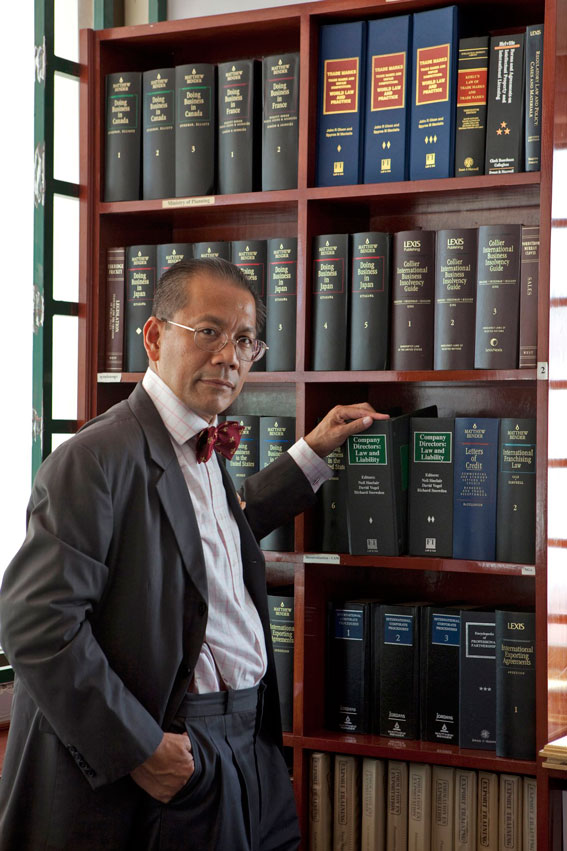Kingdom?s Construction Law Ready in 2015
Q&A
2015 Will See The Introduction Of The Long-Awaited Building Construction Law To Regulate Cambodia’s Construction Sector.
H.E. Dr. Sok Siphana, Adviser To The Royal Government Of Cambodia, Who Has Been Tasked To Draft The Building Construction Law Spoke With Construction & Property Magazine On The Development Of The Law And How It Will Shape The Development Of Future Construction Projects In The Kingdom.
1-You have been tasked by the Senior Minister of Land Management, Urban Planning and Construction to draft the Building Construction Law. What are your duties and responsibilities for this long-awaited law?
I would say that my main responsibilities as a drafter are to bring together all the policy inputs and the technical elements of the building construction regulations and practices and put them into a coherent, comprehensive and practical legislative format. The drafting process necessitates foremost that I had to spend an enormous amount of time reviewing existing policy guidelines, and governing rules and regulations in the building construction industry. Then I had to conduct extensive discussions with, perhaps I should say I had to listen to, policy makers, senior officials and the technical team at the Ministry. In fact, I am very impressed with their vast and in-depth experience and knowledge of the industry. I am humbled at having the honor to work with them on this humongous piece of legislation, which I believe will shape the future development of this country. I commend the Senior Minister of Land Management, Urban Planning and Construction for his vision and his strong and hands-on leadership during this legislation-drafting process.
2-Could you please explain generally what the Construction law is about?
The law will generally aim at ensuring that the construction industry, in development terms, contributes as a powerful source of growth to the national economy, but at the same provides safety for people through a comprehensive and balanced regulation of the entire spectrum of the building construction industry. It will provide for the adoption of a building construction code and the setting of performance standards for buildings to ensure that the necessary controls relating to building work and the use of buildings are in place.
3-How comprehensive is the scope of the law? How will the law impact the construction industry as a whole?
It will be quite a comprehensive piece of legislation as it will attempt to promote the accountability of construction owners, and building construction practitioners, as well the Building Construction Administration who have the responsibility for ensuring that building work complies with the building construction code.
4-What are the most significant areas and details the law will focus on?
A substantive portion of the law will cover the establishment of a licensing regime for building construction practitioners in order to regulate the practice of qualified persons such as architects, engineers, general or specialist building contractors, and third party accredited checkers. The other substantive part will be on ensuring the proper execution of construction works through stricter enforcement on fundamental matters related to the survey, design, execution, supervision, maintenance, and technology management of construction works. There will be also adequate provisions to regulate contracts for construction works between consumers and builders, to mention just a few.
5-How will the law impact existing and new construction projects and in what way? Are there differences between residences, private and commercial buildings, and so on?
When the law is enacted, sometime in 2015, the impact on the building construction industry will be enormous, in terms of its effect on: the promotion of the construction industry, particularly for small and medium construction businesses and support construction services; the development of construction technology; the safety and quality of construction works; and the capacity building of construction technical manpower, etc. Depending on the size of the building construction and its classification, there will be differences between residential, commercial or industrial buildings. Low risk constructions will be less regulated versus higher risk commercial and industrial constructions.
6-So far, how much of the work on the law has been completed? How many articles and chapters are expected to be included in the final draft of the law? When will the drafting be completed? When do you expect it can be enacted and applied with the implementing sub-decrees?
The bulk of the drafting work, which has lasted nearly 8 months now, is nearly done in both English and Khmer. I can’t guess how many articles we will end up with but it will be substantial. There will be many implementing sub-decrees and prakas or regulations, which will be adopted immediately after the promulgation of the law. In my 21 years living and working here, the biggest shortcoming of any, if not all, law drafting driven by donors and foreign consultants are that they are only mandated to draft the main laws and when their projects end the remaining implementing regulations are left hanging for the next several years. My approach is to draft this particular piece of legislation in a holistic and wholesome manner, including the main law, the various implementing sub-decrees and regulations all at one time. Of course, depending on the amendments of the law during the debates and the enactment process in the parliament, the Ministry can just do some minor adjustments to these regulations and they can adopt them immediately afterward.
7-Some international experts recommend Cambodia to have an independent inspection regime to check whether the construction law will be effectively implemented and followed by projects or not. Is it practical, desirable and necessary to have such a mechanism in place?
I believe you are referring to the system of third party independent private sector accredited checkers where for certain constructions the Ministry will require a certain level of expertise to prepare the requisite construction blueprints, and to oversee the geotechnical works and the structural works, etc. Yes, the intent of the law is toward that direction.
8-In the property sector, some property lawyers criticize poor property management that allows high buildings like condominiums to build in downtown areas that impact nearby buildings and residents. What are your thoughts on this urban development conundrum?
To my knowledge, the Ministry is working on incorporating a number of chapters into the draft law, which will comprise of numerous provisions governing the conditions and modalities of spatial planning and development, the landscaping and use of buildable land.
9-Gold Tower 42 is a good example where many property investors fell victim to the project being halted due to the developer’s bankruptcy. Based on best practices from other developed countries you have experienced, what would you like to see changed or improved from the government side or the private side to avoid such incidents in Cambodia in the future?
As a matter of fact, it was that case that has precipitated the Royal Government to take measures to protect the public. The Ministry of Economy and Finance, through its Prakas No. 1222 dated 15 December 2009, has instituted already a series of measures to regulate developers investing in these types of commercial and real estate development. They are required to apply for various categories of developer licenses, where stringent financial requirements are imposed, i.e. for developers who require funding or loans from banks or other financial institutions or for developers who use advance funds or deposits from prospective buyers before starting to develop their projects.
10-Is there anything else you would like to see changed or improved for the benefit of nation’s construction and property sectors?
A few ideas come to mind. First, I would encourage consumers to do more thorough due diligence or investigation on the developers or the borey owners from where they plan to buy their houses or co-owned units. Second, I would encourage the consumers to use only registered architects, engineers or building contractors if they wish to build their homes. I would like to see more capacity building for real estate agents so that they can provide better professional services to their clients. This is where the role of the Cambodian Valuers and Estate Agents Association is very important.
- Video Advertisement -



 ខ្មែរ
ខ្មែរ







